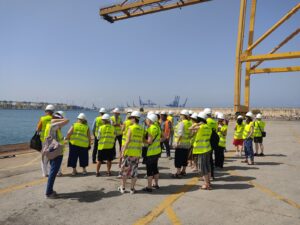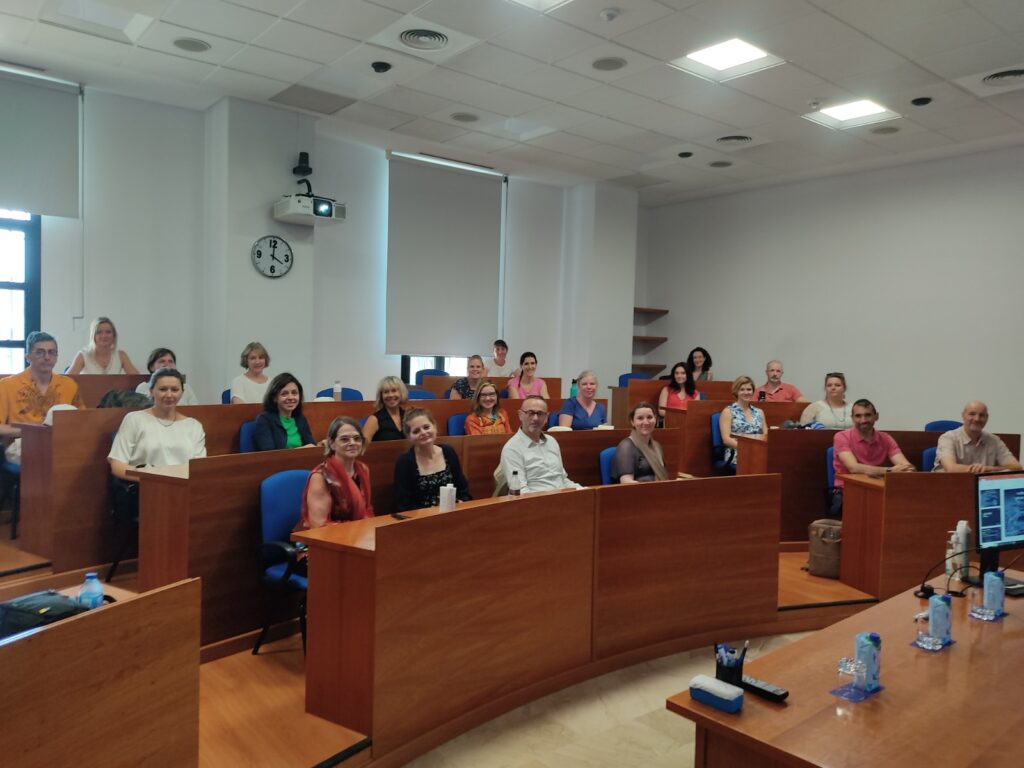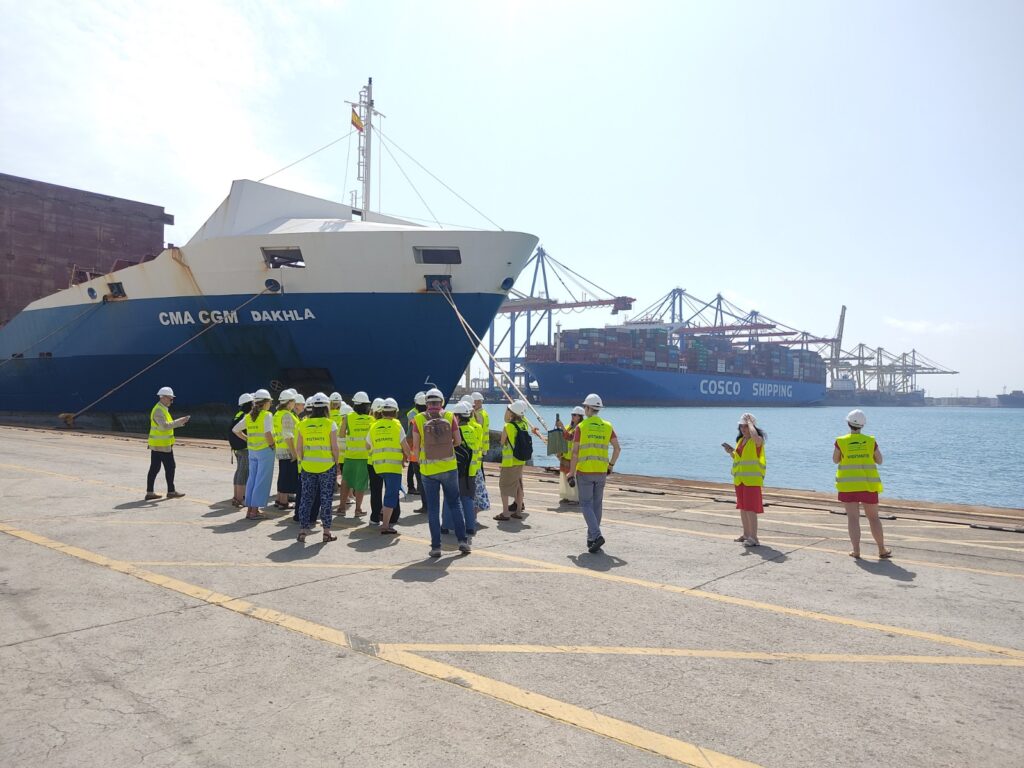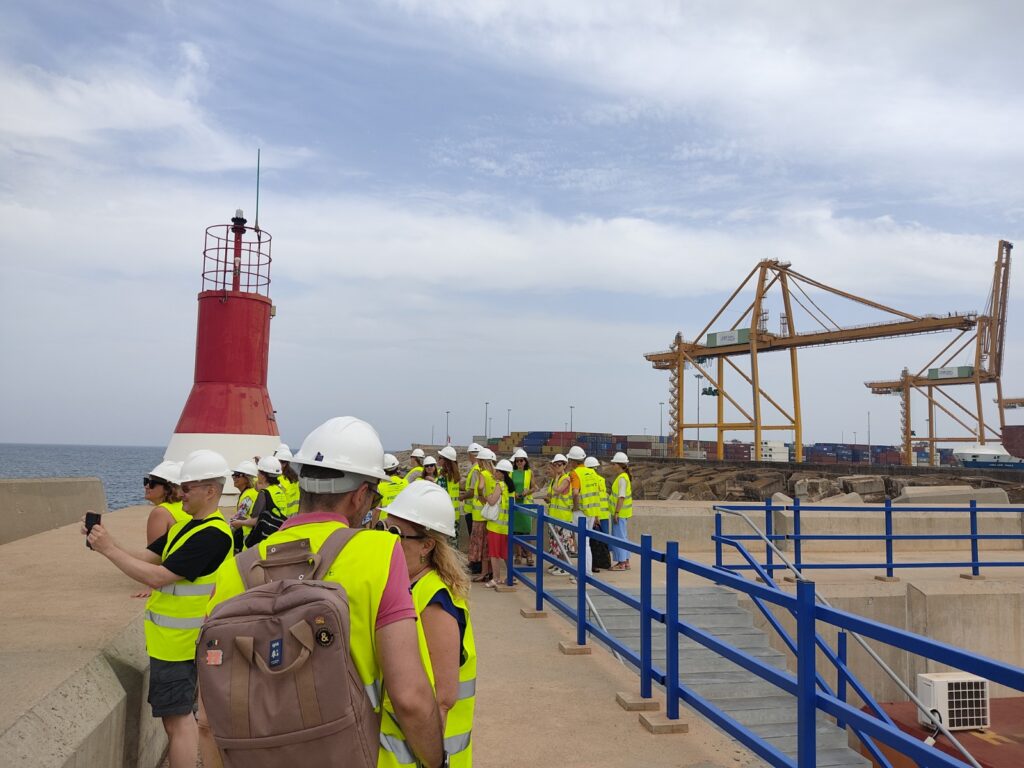
“From now on, whenever we talk about ships, I will think of the Port of València”. Louise Levicky is one of the European Union interpreters who has stopped off at the Valenciaport docks to learn the terminology of port language. The European Parliament has chosen the Port of València as a Spanish model to immerse its interpreters in the ‘language’ of the sector and in concepts of politics and international trade, very relevant issues in the European institutions. Levicky, together with 39 other European simultaneous translators, visited the Valencian terminals and the northern extension in the company of technical specialists from the Port Authority of Valencia (PAV).
València, June 2023.- “Can you send us the presentation of the Port Authority of Valencia at a later date? We could really use it because it is a mine of terminology,” said Louise Levicky, a Scottish interpreter who has been working at the European Parliament since 2018, at the end of the welcome reception. There are many reasons why Europe has chosen València as a home port for this delegation of interpreters to receive essential training which, according to their comments, will make them ‘return’ to the Valencian docks every time they translate speeches on logistics and ports.

They translate for 705 MEPs who speak 24 different languages… And how do they understand each other? Thanks to this army of interpreters who not only translate, but also interpret images and, therefore, from now on, every time they talk about ports, they will have the Port of Valencia in their minds. The 40 interpreters, who are different from the translators because they translate the political spokesperson at the same time as he/she is speaking, have arrived in Valencia for the imminent start of the Spanish Presidency of the Council of the European Union. And the Port of València, which accounts for 40% of freight traffic in the Spanish port system, was one of the first stops on the visit’s itinerary. The interpreters toured the terminals and were impressed by the size and variety of the operations.
“I was very impressed by the terminals, it is gigantic. We have been to other visiting ports, but I have never seen one so big and with such a variety of operations. For our work as interpreters in the Parliament, where international economic issues are often discussed, understanding the port context is essential,” says Levicky. “From now on, every time we talk about ships and ports, the Port of Valencia will be on my mind”, he added.

The language of a port
The day began with a presentation in the Sala Neptuno on the functioning of the Port Authority of Valencia (PAV), the fourth port institution with the best connectivity in Europe and the first in Spain. Gerardo Álvarez, supervisor of the Port of Valencia’s VTS and Eva María Pérez, director for the promotion of innovation at the Valenciaport Foundation, were responsible for explaining the main facts about the institution and then guiding them through the Cosco terminal and the northern area of the port extension.
According to the interpreters, this learning process will be of great use when international maritime transport issues are dealt with in the European Parliament. “In the coming months, we will undoubtedly have to translate issues related to port activity in Europe and we will certainly have the Port of Valencia in mind when preparing our speeches”, assures Katerina, a Greek interpreter with extensive experience in international shipping logistics.
The interpreters got to know in detail the operations of the Port of Valencia with the aim of deepening their linguistic knowledge of the sector: the dimensions of the goods, the work of the stevedores, the international routes of the vessels and, in particular, the plan of zero net emissions in 2030, have monopolised the majority of the questions.
In particular, the decarbonisation project of the port which will be a reality in 2030, a goal to be achieved through the general electrification of the Port and the H2PORTS project, a pioneering initiative in the use of hydrogen, aroused great interest. “I was very surprised by the zero emissions project. It is important to take care of the planet and we have already seen that the project is being carried out when we saw that the boat which passed in front of us was already powered by hydrogen”, says Alberto, an Italian interpreter who filmed the propelled boat with his mobile phone.

Valencia and its Port: benchmarks for the EU
The last part of the tour took place in the northern area, dedicated to the forthcoming enlargement, where the English, Italian, Greek, Slovenian, Polish, Slovakian and Danish interpreters reflected on the magnitude of Valenciaport and on how important it is for their profession to master port terminology and concepts, as they are linked to the economy, international politics and trade, very much in line with the affairs of the European Union.
During the week they will visit the city of Valencia to soak up the Spanish culture in preparation for the next six months of Spain’s leading role in the European institutions. Over the next few days, the City Hall, Les Corts Valencianes, the Albufera and companies such as Porcelanosa and Ford will be their stops, visits which will allow them to soak up Spanish culture.

